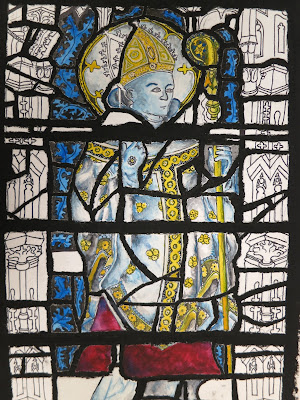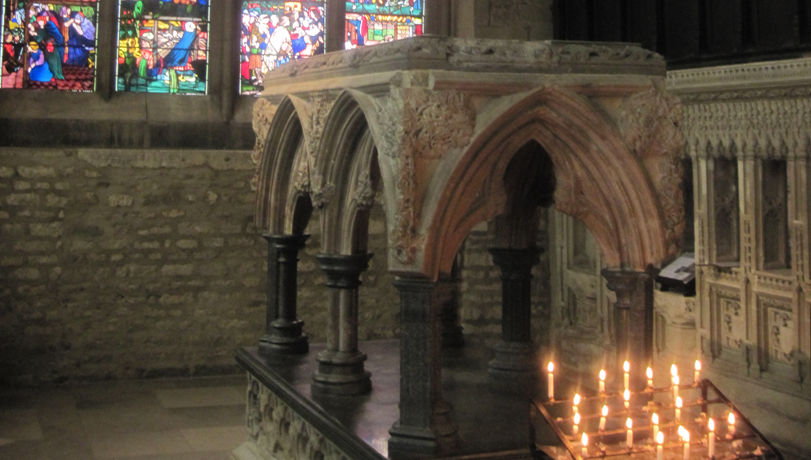 |
| St. Wulfstan of Worcester (watercolor of stained glass by myself) |
Born in 1008, Wulfstan began his career at Worcester as a monk in 1038 and then Prior of the Benedictine Cathedral Priory. When the bishop of Worcester, Ealdred, became Archbishop of York, Wulfstan was appointed the position which he reluctantly accepted like so many other saintly bishops (namely Sts. Cuthbert, Hugh and Peter of Tarentaise). After the conquest, Wulfstan submitted to William I and to his new Archbishop of Canterbury, Lanfranc, rather that risk his position (most other Saxon bishops were deposed) and thus his relationship to the people he led with great devotion and efficiency. Wulfstan incorporated the rules of his previous monastic life into his role as bishop, running his diocese, and sometimes others when they were vacant, as if he were following a rule. He designed a system for episcopal visitations (while many of his episcopal colleagues enjoyed their palaces), rebuilt Worcester Cathedral, consecrated numerous churches encouraged to be patronized by local lords, and was notorious for his charity and ministry to the poor and dispossessed. It was towards the end of his career that he cooperated with Lanfranc to end the capture and sale of English slaves at Bristol by Vikings. For his submission to the new regime and his passionate undertaking of the bishopric, he was trusted and valued by the first two Norman kings even though the court claimed he was unfit for his position as he could neither speak French and was "unlearned." Whether the latter was true or not (it probably wasn't as the Saxon Benedictines, like most others, were patrons of learning) his leadership, charity and devotion are ample evidence of his holiness. He died in 1095 while washing the feet of the local poor. He was the last surviving Saxon bishop when he died and was immediately venerated as a saint.
St. Wulfstan reminds us of the tentativeness, weakness and inhumanity of all human governments and regimes. For St. Wulfstan, a Saxon or a Norman king was of little importance though of great consequence, to his duty as shepherd and caretaker his people. Christ is the only perfect, just and eternal government, all others are stained by humanity's innate sin and fleeting. Before Wulfstan passed the government of his country from one ruler to another. He chose not to side with one or the other but with Christ, the real and only King, and continued his duties as laid out under his rules.
In another sense, bishops and priests of today should look to St. Wulfstan as a model of administration. Wulfstan followed a kind of "episcopal rule" (a phrase I am making up) which allowed him to fully integrate his life with his duties as bishop. Such a rule for today's bishops and priests, whether it was one of evangelism, visitation, or ministry in particular, or each combined, would recast a much holier light on the episcopal office as it is and was once was regarded-the office of today's apostles and heralds of the risen Christ.
Collect: (From the Episcopal Church)
Almighty God, whose only-begotten Son hath led captivity captive and given gifts to thy people: Multiply among us faithful pastors, who, like thy holy bishop Wulfstan, will give courage to those who are oppressed and held in bondage; and bring us all, we pray, into the true freedom of thy kingdom; through Jesus Christ our Lord, who liveth and reigneth with thee and the Holy Spirit, one God, for ever and ever. Amen.

No comments:
Post a Comment